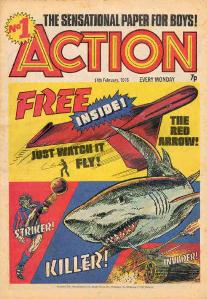
Action issue 1, 14 February 1976
Action was a boys' adventure comic devised by Pat Mills and published by IPC in 1976-1977. Violent and anti-authoritarian, it caused controversy in the media and was closed down and briefly revived in toned-down form, before being merged into Battle to form Battle Action.
Notable stories:
- "Hook Jaw" was created by Mills as a Jaws cash-in and the flagship title of the comic. The strip was scripted by Ken Armstrong and drawn by Ramon Sola. Hook Jaw is a Great White Shark and the hero of the series, even though he spends most of his time eating most of the human cast of characters. The name Hook Jaw comes from the gaff hook stuck in the shark's jaw after some fisherman tried to catch the creature shortly before being eaten by it. Mills gave the strip an environmental edge by having Hook Jaw eat corrupt humans, or criminals, seeking to exploit the seas, as well as anyone else unlucky enough to get near him. Hook Jaw appeared in three stories before the ban. The first was set on an oil rig, the second was set on an island resort in the Caribbean, and the third was set just off the south coast of England. Hook Jaw returned after the ban, but no longer ate as many people and if he did it was off panel. The strip also lost the environmental themes Mills had placed in it. Spitfire Comics in 2007 released a collection of the pre-ban strips in Collected Hook Jaw vol. 1.
- "Black Jack" was created by John Wagner, later Jack Adrian, with art by Trigo. It told the story of Jack Barron, a boxer who fights to help poor kids knowing that he runs the risk of going blind. The strip was accused of being racist even though it was one of the first times a black character was the hero of a British Comic strip.
- "Death Game 1999" was written by Tom Tully. The series was a cash-in on the success of Rollerball and dealt with a lethal future sport played by condemned prisoners. Art was provided by Costa, Ian Gibson (2 pages) and Massimo Bellardinelli, John Stokes and others. The strip was almost as popular as Hook Jaw. After the relaunch, "Death Game 1999" became "Spinball", and turned into a formulaic adventure strip without the ambiguities which featured in the original.
- "Kids Rule OK" was written by Jack Adrian with art by Mike White; this series drew most criticism. London, 1986: A plague has wiped out the adult population, with the result that violent gangs of children run riot. The strip was instantly controversial with its heavy anti-authoritarian tone and extreme violence. The strip never survived the ban; two episodes were destroyed by IPC entirely, whilst those that did survive were heavily edited. A full version of the story, with a text insert to cover the missing episodes, can be found in Action – The Story of a Violent Comic.
- "Hellman of Hammer Force", written by Gerry Finley-Day, was the story of a German Panzer major. It established a pattern followed by 2000 AD for having an unconventional or unsympathetic character as the hero. The strip returned after the ban, but stripped of its politics became a conventional war adventure story.
- "Dredger" was a tough Dirty Harry–type agent. The strip was popular due to its increasingly bizarre and violent action scenes. The strip survived the ban, but like the others became a conventional adventure strip.
- "Look Out For Lefty" was an unconventional football strip based on the adventures of Kenny Lampton, a working-class teenager whose powerful left foot gave him the nickname of "Lefty". It was unlike any other football strips in British boys' comics at the time because the strip would include football hooliganism, as well as Lefty's not always being a clean-cut hero. The violence on display in the strip mirrored the real-life football violence taking place at the time, most notably during a game between Aston Villa and Rangers. After the ban, the strip became a conventional Roy of the Rovers–type strip and removed any hint of controversy. The strip was written by Tom Tully, with art from Barrie Mitchell and Tony Harding.
External links
- Kids Rule UK sample strip at ComicsUK